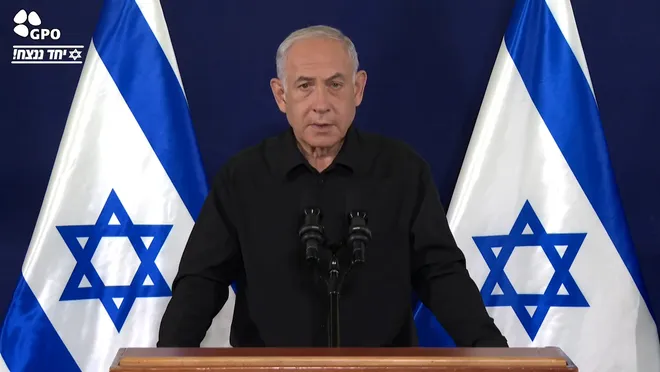Benjamin Netanyahu, the prime minister, stated that after the conflict, Israel intends to maintain strict control over the Gaza Strip, a coastal enclave ruled by Hamas and home to over two million Palestinians.
Following the conclusion of the battle with Hamas, Netanyahu stated that Israel “will have overall security responsibility” in Gaza for “an indefinite period”—a month after the Hamas attack that claimed 1,400 lives in Israel. In an interview that aired Monday night, he made the comments with ABC News. With Hamas’s Oct. 7 border crash and the violent spree that claimed 1,300 Israeli lives before the group fled back to Gaza with the hostages, the Israeli military has been pounding Gaza.
Since then, the Israeli government claims that the dead toll has increased to almost 1,400. The Gaza Health Ministry, under the control of Hamas, reports that over 10,000 Palestinians have died.
It was the first time that Israel’s leader publicly revealed his apparent long-term strategy for Gaza, which Israeli bombings have largely turned to ruins, even if Netanyahu did not go into detail.
According to the health ministry administered by Hamas, approximately 10,300 individuals, including over 4,100 children, have died as a result of Israel’s attacks in Gaza throughout the past month. UN Secretary General António Guterres has issued a warning, claiming that Gaza is turning becoming “a graveyard for children.”

RELATED: Biden Urges Temporary Halt in Israel-Gaza Conflict to Secure Hostage Release
In the 1967 Mideast conflict, Israel took Gaza, the West Bank, and east Jerusalem. According to Netanyahu, those who do not choose to follow Hamas’ path should rule Gaza.
The Palestinian Authority, which maintains administrative authority over portions of the West Bank, lost power in Gaza to Hamas in 2007—two years after Israel withdrew its forces. Israel still controls all but one of Gaza’s border crossings, its shoreline, and its airspace since that disengagement.
Although the details of Netanyahu’s “overall security responsibility” for Gaza were not immediately apparent, former national security council adviser Nimrod Novik stated that there is a “notion circling around” that it might resemble the agreement Israel has with the Palestinian Authority in the so-called Area B portion of the West Bank.
The Oslo Accords, agreed in 1993 and 1995 by Israel and the Palestine Liberation Organisation, separated the West Bank into three administrative areas: Area A, Area B, and Area C. Education, health care, and other civilian affairs are under the Palestinian Authority’s jurisdiction in Area B. Regarding security matters, Israel has complete authority.
Former Israeli prime minister Shimon Peres’s foreign policy advisor Novik is currently a fellow at the Israel Policy Forum, an American Jewish group that supports a two-state resolution to the Israeli-Palestinian issue. In the end, he wasn’t sure if Netanyahu’s remarks were genuinely intended to be helpful or if they were just a result of political necessity.

RELATED: Unveiling Gaza’s Hidden tunnels: Israel’s possible Ground Invasion Prep
His motivations for proposing it are largely unrelated to what would transpire the morning following the Israel Defence Forces’ desired withdrawal from Gaza when their job is finished. Additionally, everything has to do with the coalition dynamics and the factions he depends on to maintain his majority in government; these groups are averse to the idea of returning the Palestinian Authority to Gaza.
A request for clarity on Netanyahu’s plan for Gaza was promptly answered by his staff. Secretary of State Antony Blinken of the United States has indicated that, contrary to Israel’s stance, the United States prefers the Palestinian Authority to be at the forefront of negotiations about Gaza’s future. According to Mahmoud Abbas, President of the Palestinian Authority, “the Gaza Strip is an integral part of the State of Palestine.”
Tzipi Livni, a veteran of Israel’s cabinet positions—she served as vice prime minister and foreign minister among others—said she was unwilling to weigh in on the prime minister’s remarks, but overall they seemed to indicate that “Israel does not want to reoccupy Gaza.”
